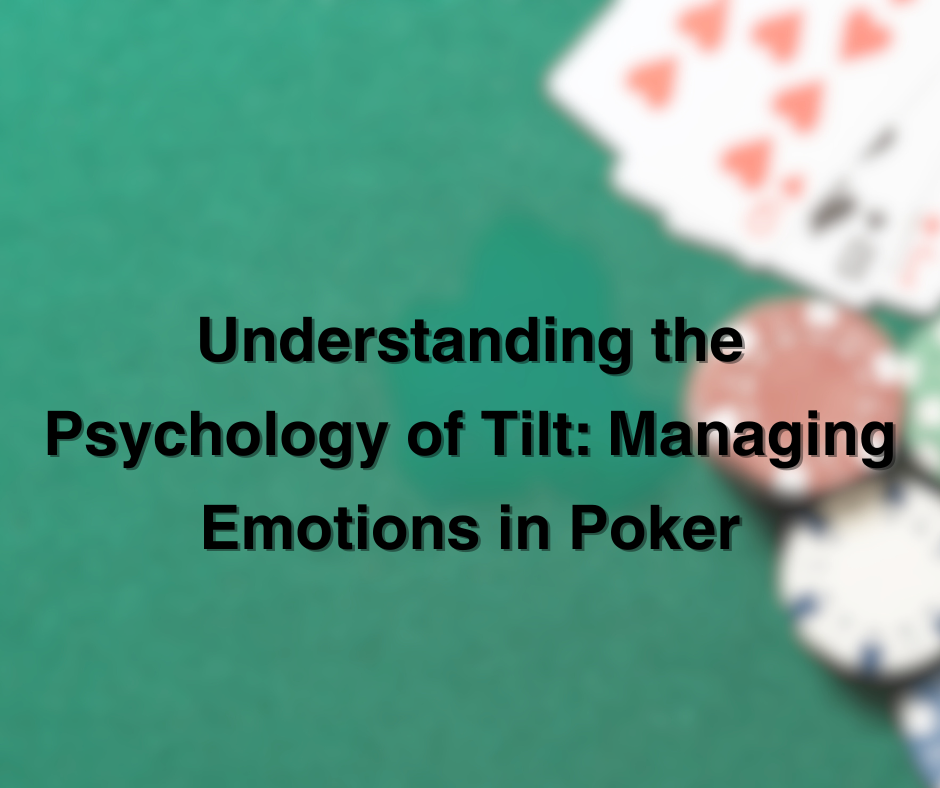
Tabla de contenidos
Alternar¿Qué es el tilt en el póker?
In poker, tilt refers to a state of emotional or mental frustration that causes a player to play suboptimally. It often occurs after a significant loss or a series of bad beats, leading to irrational decision-making and increased aggression.
¿Cómo afecta el tilt a los jugadores de póker?
Tilt can have a profound impact on poker players, both psychologically and financially. It impairs judgment, leads to impulsive decisions, and causes unnecessary risks. This emotional state often creates a vicious cycle—losses lead to tilt, which leads to more poor decisions and further losses. Whether you’re just starting to play poker online or are a seasoned pro, recognizing and overcoming tilt is key to long-term success.
¿Cuáles son los desencadenantes comunes de la inclinación?
Several factors can trigger tilt in poker players. Losing a significant hand, experiencing a series of bad beats, or encountering an obnoxious opponent can all contribute to tilt. Additionally, external
factors such as fatigue, stress, or distractions can exacerbate tilt and make it harder to control.
If you’re struggling with repeated losses, our guide on how to handle losing streaks without going on tilt offers practical tips to stay composed.
¿Cómo pueden los jugadores reconocer el tilt?
Reconocer el tilt es crucial para que los jugadores de póquer mitiguen sus efectos. Los signos de inclinación pueden incluir aumento de la frecuencia cardíaca, sudoración, respiración superficial y respuestas emocionales intensificadas. Los jugadores también deben tener en cuenta los cambios en su proceso de toma de decisiones, como las apuestas impulsivas o la desviación de un plan de juego estratégico.
Estrategias para gestionar la inclinación
Managing tilt requires a combination of self-awareness and discipline. One strategy is to take a break from the game to regain composure and refocus. Deep breathing exercises or meditation can help calm the mind and reduce stress. Setting limits on the amount of money or time spent playing can also prevent tilt from escalating.
If you’re playing with new poker rules in 2025, understanding rule changes can reduce the stress and surprises that trigger emotional reactions.
Desarrollar la resiliencia emocional
Building emotional resilience is essential for poker players to cope with the ups and downs of the game. This involves accepting that variance is inherent in poker and focusing on long-term results rather than short-term outcomes. Seeking support from peers or a mentor can provide valuable perspective and encouragement during challenging times.
or beginners and pros alike, coping with swings in the game is crucial. Our article on losing streaks and tilt dives deeper into this mindset.
El papel de la mentalidad en el póker
Mindset plays a significant role in how players approach tilt. Adopting a growth mindset, which
emphasizes learning and improvement, can help players bounce back from setbacks and maintain a positive attitude. Avoiding negative self-talk and reframing losses as opportunities for growth can also bolster mental resilience.
Players who start playing poker online with a focus on mindset tend to grow faster and tilt less often.
Cultivar la atención plena en la mesa
Buscando ayuda profesional
Para algunos jugadores, la gestión del tilt puede requerir asistencia profesional. Los terapeutas o consejeros capacitados en terapia cognitivo-conductual (TCC) pueden ayudar a las personas a identificar y abordar los problemas psicológicos subyacentes que contribuyen a la inclinación. También pueden enseñar estrategias de afrontamiento y brindar apoyo continuo para ayudar a los jugadores a manejar sus emociones de manera más efectiva.
Construir una comunidad de póquer solidaria
Estrategias para superar el tilt en el póquer: una guía completa
Identificar los desencadenantes de la inclinación
Bad Beats: Experiencing a string of unlucky hands or losing a significant pot can trigger feelings of frustration and anger.
Obnoxious Opponents: Dealing with rude or disrespectful opponents can disrupt focus and exacerbate tilt.
Fatigue and Stress: Physical and mental exhaustion can impair judgment and make it harder to control emotions.
Distractions: External distractions, such as noise or interruptions, can disrupt concentration and increase susceptibility to tilt.
Desarrollar la resiliencia emocional
La regulación emocional es la base de una buena toma de decisiones en el póquer. Cuando la ira, el miedo o la frustración se filtran, nublan el juicio y distorsionan la evaluación de riesgos. La investigación muestra que las emociones negativas como la ira moral reducen significativamente la precisión matemática en las decisiones de póquer, particularmente cuando los jugadores se sienten observados socialmente.
Maintaining a calm, analytical mindset—even after bad beats—preserves your ability to evaluate pot odds and ranges objectively.
Cultivando la atención plena en la mesa
Practicing mindfulness can help poker players stay grounded and focused during gameplay. Techniques such as:
Visualization: Visualizing successful outcomes and staying focused on the present moment can enhance concentration and prevent tilt.
Body Scanning: Paying attention to bodily sensations can help players stay attuned to their emotions and reactions, enabling them to make more rational decisions.
Sensory Awareness: Staying mindful of sensory experiences, such as the feel of the cards or the sounds of the chips, can enhance presence and prevent distractions.
Implementación de estrategias de autorregulación
La autorregulación es crucial para controlar la inclinación y mantener la compostura en la mesa. Las estrategias clave de autorregulación incluyen:
Taking Breaks: Stepping away from the game when emotions run high can provide valuable time to regroup and refocus.
Deep Breathing: Engaging in deep breathing exercises can help calm the nervous system and reduce stress levels.
Setting Limits: Setting limits on the amount of time or money spent playing can prevent tilt from escalating and protect bankroll management.
Reflexiones finales: la opinión de Bluffing Monkeys sobre Tilt
Tilt in poker isn’t just about losing—it’s about how you respond to loss. From identifying triggers to managing emotions and seeking support, tilt is a challenge that every player must face.
At Bluffing Monkeys, we’re here to help you sharpen your game, stay composed under pressure, and make smarter plays with every hand.
